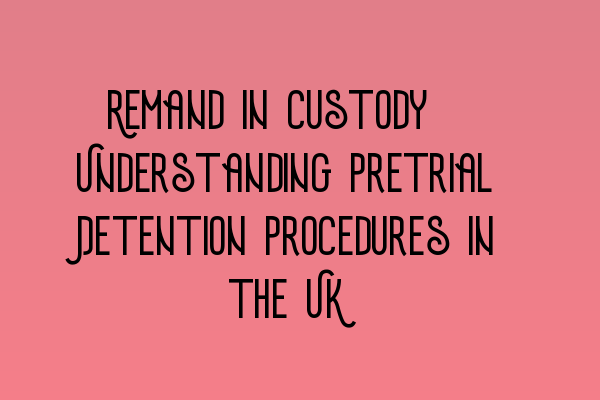Remand in Custody: Understanding Pretrial Detention Procedures in the UK
When individuals are accused of committing a crime in the United Kingdom, they often face the possibility of being remanded in custody. Pretrial detention, or remand, is the process of holding a suspect in custody until their trial date. This article aims to provide a comprehensive understanding of the procedures involved in remand, ensuring that you are well-informed about your rights and the legal process.
What is Remand?
Remand refers to the detention of an individual charged with an offense who is awaiting trial. It is important to note that remand is different from being sentenced. During the remand period, the individual is considered innocent until proven guilty in a court of law.
Remand can occur for various reasons including:
- Suspected flight risk
- Possible interference with witnesses
- Potential danger to the public
If any of these factors are deemed significant, a judge may order the remand of the accused person.
The Process of Remand
When an individual is arrested, they may be taken into custody and brought before a court within 24 hours for an initial hearing. During this hearing, various factors will be considered to determine if remand is necessary.
The court will consider:
- The seriousness of the offense
- The strength of the case against the accused
- The accused’s criminal history
- Any potential risks the accused poses to the community or witnesses
If the court decides that remand is necessary, the accused will be held in custody until their trial date. It is important to understand that the length of the remand period can vary depending on the complexity of the case and the court’s schedule.
Challenging Remand
If you find yourself remanded in custody, it is crucial to consult with a solicitor who specializes in criminal law. They will be able to assess your case and advise you on the best course of action to challenge the remand decision.
Depending on the circumstances, your solicitor may argue that:
- There are suitable bail conditions that can mitigate flight risk
- There is no evidence of interference with witnesses
- There are alternative measures, such as electronic monitoring or reporting to a police station, that can address potential danger to the public
Your solicitor will present these arguments to the court, and if successful, the remand decision may be overturned.
Conclusion
Remand in custody is a significant aspect of the UK criminal justice system. Understanding the procedures involved can help accused individuals navigate the process more effectively. If you find yourself facing the possibility of remand, it is crucial to seek legal advice from a knowledgeable solicitor.
To learn more about the Solicitors Qualifying Examination (SQE) format, check out the article on Demystifying the Solicitors Qualifying Examination Format. For aspiring entrepreneurs, the step-by-step guide on LLC Formation Made Simple: Step-by-Step Guide for UK Entrepreneurs provides valuable insights on setting up a business in the UK. Understanding business regulations is crucial, and you can find a comprehensive overview in the article on Business Regulations in the UK: A Comprehensive Overview. For those preparing for the SQE exam, useful strategies and resources can be found in the article on Preparing for the SQE Exam: Strategies and Resources for Success. Additionally, participating in SQE workshops and webinars can accelerate your preparation, as discussed in the article on SQE Workshops and Webinars: Accelerate Your Exam Preparation.
